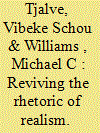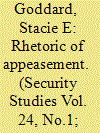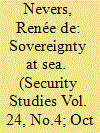|
|
|
Sort Order |
|
|
|
Items / Page
|
|
|
|
|
|
|
| Srl | Item |
| 1 |
ID:
138854


|
|
|
|
|
| Summary/Abstract |
Perhaps the most consequential effort to expound a grand strategic narrative was Woodrow Wilson’s campaign to persuade the American people, the US Senate, and world public opinion to embrace his concept for making the world safe for democracy. Wilson and his interlocutors in grand strategy illustrate the role of rhetoric and narrative in managing two kinds of complexity in discussions of grand strategy: the conceptual integration of facts and values (of “is” and “ought”) in strategic persuasion and the political integration of diverse perspectives among partners in a strategic coalition. In particular, I explore the hypothesis that rhetorical and narrative persuasive devices permit grand strategists to obfuscate internal contradictions in their vision, facilitating persuasion in the short run but producing characteristic patterns of eventual policy failure and thereby serving as an engine of change in grand strategy.
|
|
|
|
|
|
|
|
|
|
|
|
|
|
|
|
| 2 |
ID:
138851


|
|
|
|
|
| Summary/Abstract |
Richard Betts argued that strategy—the idea that a state’s political ends could be reliably linked to its coercive means—is a necessary illusion. Without strategy, war is mindless killing; but its rationales cannot guide state choices because there is a yawning gap between the macro level where strategy is articulated and the micro level of day-to-day choices. That gap is particularly insurmountable when beginning, as Betts does, from a rationalist model of action. I propose that grand strategy is best understood as a case of collective intentionality, a concept that amends the rationalist framework in a way that makes it possible to clarify an analytic pathway from grand strategy to state behavior. Crucial to this pathway are legitimation processes found in forums, and I argue that grand strategies can pull state behavior when they are tied to forums. Focusing on the interstate case, I develop a causal mechanism from the forum, to ways of talking, to commitment-consistent behavior. I illustrate the argument with an example from the Concert of Europe. Stacie E. Goddard and Ronald R. Krebs propose that legitimation processes might be particularly successful where institutions are weak. My framework helps flesh out that proposition: even in anarchy, action commitments can affect states’ behavior through the mechanisms of the forum.
|
|
|
|
|
|
|
|
|
|
|
|
|
|
|
|
| 3 |
ID:
138850


|
|
|
|
|
| Summary/Abstract |
In both disciplinary history and contemporary methodology, realism is conventionally cast as the antithesis of rhetoric. Born in reaction against the empty liberal rhetoric of interwar liberalism and espousing a robust materialism and rigorous rationalism, realism often seems the obstacle that rhetoric’s focus on language, narrative, and social construction must inevitably confront and the challenge around which debates must again inevitably revolve. This article challenges this vision of the relationship between rhetoric and realism. Returning to the birth of international relations in the immediate post-war era, we demonstrate that early realists perceived rhetoric as central to action in domestic as well as international politics and that it was particularly important in the United States. This realist rhetoric is marked by an engagement with grand politics, with the relationship between rhetoric, political identity, social mobilization, political leadership, and foreign policy. Rather than taking either the American state or its national interest for granted, post-war realists sought to counter the dangers of the dominant historical rhetorics of American foreign policy and to develop an alternative rhetoric that could insulate American democracy from destructive tensions and provide the basis for robust and responsible action in world affairs. Recovering the relationship between realism and rhetoric is important not only in challenging disciplinary and methodological orthodoxies that obstruct creative theorizing, but also for its incisive contributions to thinking about American foreign policy amidst the profound changes and challenges it confronts today.
|
|
|
|
|
|
|
|
|
|
|
|
|
|
|
|
| 4 |
ID:
138852


|
|
|
|
|
| Summary/Abstract |
Few grand strategies have been more scrutinized than Britain’s decision to appease Nazi Germany. From 1933 to 1938, Britain eschewed confrontation and attempted to settle German demands. However in the five months following the negotiations at Munich, the British abandoned appeasement and embraced a policy of confronting the German state. The roots of both appeasement and confrontation can be found in Germany’s legitimation strategies. Until the Munich crisis, Adolf Hitler justified Germany’s aims with appeals to collective security, equality, and self-determination—norms central to the European system established by the Treaty of Versailles. After Munich, in contrast, German politicians abandoned these legitimation strategies, arguing instead that expansion was justified as a matter of German might, and not international rights. As Britain came to see German demands as illegitimate, so too did they decide this revisionist state was insatiable, impervious to negotiation, and responsive only to the language of force.
|
|
|
|
|
|
|
|
|
|
|
|
|
|
|
|
| 5 |
ID:
143741


|
|
|
|
|
| Summary/Abstract |
The oceans present a variety of perils to both states and private actors, ranging from smuggling to direct attacks on vessels. Yet, a disconnect exists between states’ maritime power and sovereign fleets due to the emergence of open shipping registries in the 20th century. How have great powers like the United States responded to threats generated by transit of the oceans for legitimate and illicit purposes? The nature of peacetime security threats that states confront at sea has shaped divergent responses. The main maritime powers draw a distinction between threats aimed at states and threats to commerce. Where perceived threats to the state are concerned, great powers have sought to revise understandings of the protections sovereignty provides—specifically, by seeking expanded interdiction rights—to further their own security goals. When maritime powers perceive that international commerce is under threat, they delegate the sovereign protection function both upward to internationally sanctioned maritime coalitions and outward to private security firms. These policies are responses to the security challenges that result from the decoupling of sovereign power and the merchant fleet that followed the emergence of open shipping registries.
|
|
|
|
|
|
|
|
|
|
|
|
|
|
|
|
| 6 |
ID:
138853


|
|
|
|
|
| Summary/Abstract |
Franklin Delano Roosevelt was, by all accounts, a master orator. Yet success eluded him as he sought to make his fellow citizens aware of the threat Nazi Germany posed and to banish isolationists to the illegitimate margins. At other times, however, Roosevelt’s campaigns to shift the underpinnings of national security debate were more effective. Notably, his definition of the adversary as the Nazi regime, rather than the German people, deeply shaped public discourse during the Second World War. This article explains the uneven results of Roosevelt’s narrative projects—and those of other presidents—as a product of the intersection of the rhetorical mode he adopted and the rhetorical demands of the environment. During unsettled times, public demand for storytelling is elevated, and presidents who seize that opportunity can shape the narrative landscape and thereby policy. Presidents who fail to align their rhetoric to the moment—such as Roosevelt offering predominantly argument during these critical junctures—allow alternative narratives to proliferate. More broadly, this article offers an account of the structuring of legitimation in the national security arena.
|
|
|
|
|
|
|
|
|
|
|
|
|
|
|
|
| 7 |
ID:
143740


|
|
|
|
|
| Summary/Abstract |
This article examines the role that nuclear non-use norms play in non-nuclear state decision making during confrontations with nuclear opponents. The claim that norms constrain nuclear use is one of the most important examples of norms influencing state security decisions. Many extend the claim to argue that non-nuclear weapon states realize norms constrain the nuclear opponent and therefore discount the possibility of nuclear strikes. To date there has been little effort to examine this extended claim. This article outlines the normative claims and an alternative strategic logic. It assesses the positions by examining two cases that the normative literature highlights: Egypt in 1973 and Iraq in 1990. The article finds little evidence that the non-use norm played a significant role in non-nuclear state decision making. Rather, non-nuclear state leaders took their opponents’ nuclear arsenals very seriously and sought to reduce the risks of nuclear strikes.
|
|
|
|
|
|
|
|
|
|
|
|
|
|
|
|
|
|
|
|
|